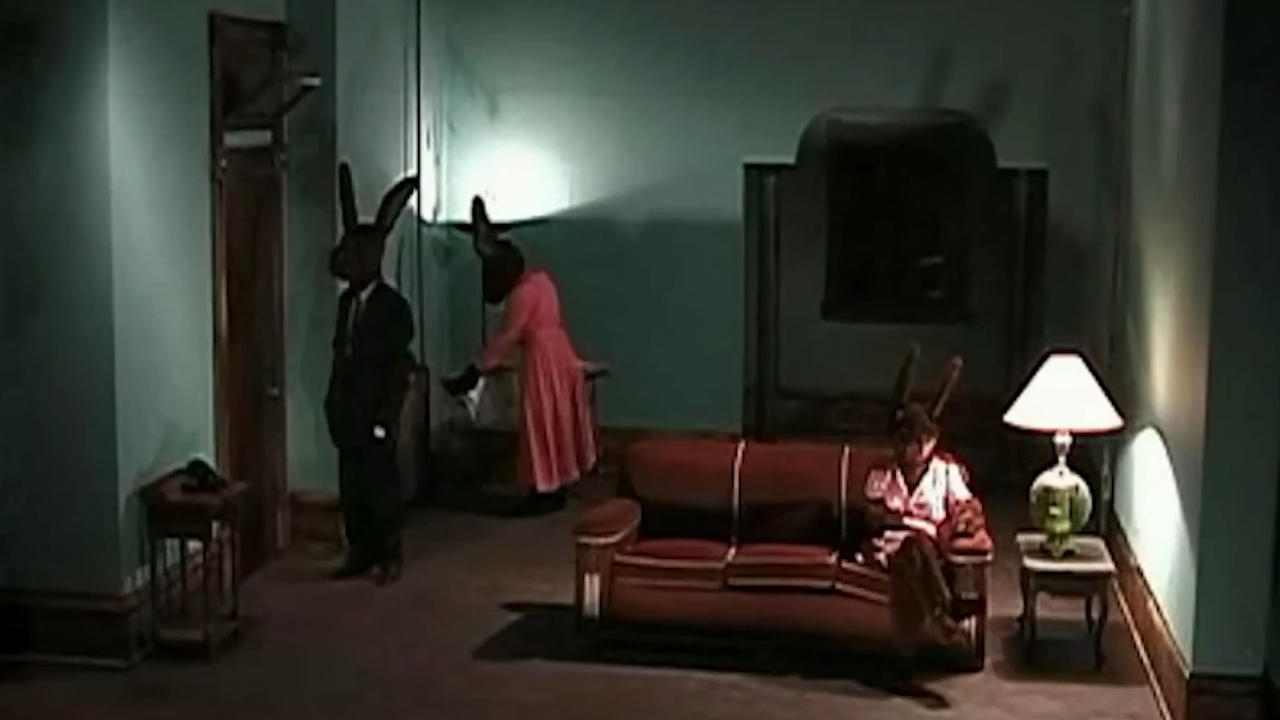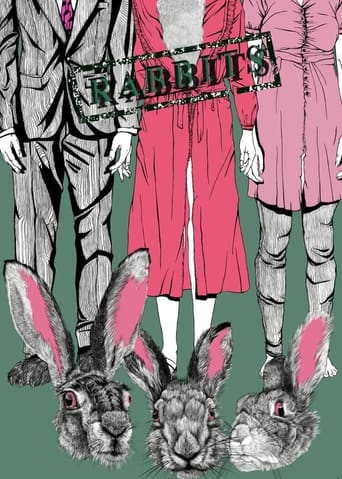

This is a beautiful film from David Lynch, but unfortunately, not a lot of people are going to view it that way. The reason it's so stunning to me is because there is so much tension in just one continuous shot. It's definitely creepy but there are a lot more layers to it than just that. I don't think anyone ever knew that a video with people in bunny costumes and a laugh track could be so uncomfortable. It's one of the most ambiguous things I've ever seen but I'm OK with that, because it is so well done that in a way, I don't have to know what exactly is going on. It's a piece of art and it doesn't have to be anything more than that. Check this one out and I think you'll find that it is obviously Lynch behind the scenes!
... View MoreMaybe I'm just a nut, but I rarely find myself in either of the usual camps regarding Lynch flicks. Rabbits is a good example: I have not desire to "figure it all out," nor do I think it's drivel. It's an interesting experience just as it is.The best analogy I have for watching a Lynch film is hearing a song in a made-up language: the vocabulary might be lost on me, but the mood is crystal clear. I don't puzzle over the words. Since I have no reference point for intellectualizing them, I don't distract myself by trying. Instead, I sit back and let the nuances of emotion transcend the sound. Really, isn't that the power of art? That same philosophy applies to film. It would be silly to design a film that totally rejects convention to be the vehicle for one specific, decipherable message. You just kinda "feel" the movie the way you feel music.With that purpose in mind, I waited until night, turned off the lights, and watched Rabbits. In a few places I got bored, but mostly it was great. It's creepy, it's dream-like, it's surprising. I don't want to "understand" what's happening. To me, a good mystery isn't one where I go "oh" at the end - it's one where I feel like turning on all the lights in your house at the end. On that count, Rabbits delivers. What else could you want?
... View MoreLynch really elevated my opinion of him here. This is very, very well constructed. It is the highest art.That means that any "explanation" will be worthless. You can read some other material to discover something of what you will see.Its unsettling and strange, hypnotic and lyrical. That it is in several "episodes" is all a part of how certain familiar forms are subverted to give us something that has identity and also has a sort of meta-identity defined by deviance from the expected.My observation will be highly personal. I see this as a sort of "Rosencrantz and Guildenstern" but instead of referencing "Hamlet" engages "Alice in Wonderland." It fits, especially if you are inclined as I am to blow Alice into something as world-swallowing as Hamlet. Where Hamlet is all about what it means to sit in the world, Alice works at more refined level, being all about what it means to carry a name in the world.One is about being and the other about what we see and acknowledge about being. Its this second conceptual space that Lynch inhabits, always has. His "firewalking" TeeVee stuff bends notions of representation and discovery, the amusement being not in what we see, but in the difference between what we expect to see.Let's look at the entire vocabulary he has toyed with. First, he acknowledges the audience (laugh track), camera (static but in and out of focus), narrative (drawn more overtly by its fragmentation), framing (with very formal, abstract composition) and "acting," which here consists more of pauses and empty spaces than anything we normally associate with acting.And then there's the bending of the form. We have a demon that appears twice. Its noir drawn tightly, especially since there is a hint that the demon or his avatar as perhaps a "lost dog" is driving the entire situation. And then we have three "performances," one each by the three characters. These are accompanied by an ignited set, literally ignited. The performances, which each occupy an episode, are pretty transcendent in terms of what we would see in an ordinary drama. In such a case, each would "solo" in such a way that their soul was revealed. Its the challenge of the writer to weave this into events in such a way that we don't see the performer revealing his character overtly. This is different; all pretense is removed. The character enters and opens its heart with no narrative baggage. What the character tells us actually has more information about context than the surrounding context provides.Ted's Evaluation -- 3 of 3: Worth watching.
... View MoreIt's spooky, it's strange (hell it's even funny) and it's dangerously spellbinding!!! Rabbits is the mother and father of all nightmares. The acting, the movements, the lighting and the colors are all brilliant and some of the singing of Rebekah del Rio reminds you of Greek tragedy. I always say that there are no bad David Lynch films. There are just people who don't understand them. Once you take the trip down the abysmal world of the subconscious, you don't want to wake up. We all have fears and we all definitely have Rabbits in our heads. CAN'T WAIT for INLAND EMPIRE...
... View More